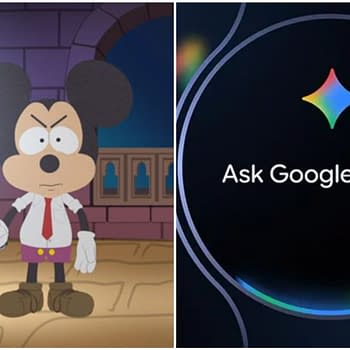Posted in: Movies | Tagged: ghost in the shell, racism, scarlet johannson, whitewashing
[SPOILERS] The Twist In 'Ghost In The Shell' Somehow Makes The Whitewashing Even More Racist

.
.
.
.
.
.
.
.
.
.
.
.
.
.
.
.
.
.
.
.
.
.
.
.
Ghost in the Shell was originally a Japanese manga and anime that starred a cyborg named Motoko Kusanagi. Since this a Japanese story that takes place in Japan, Motoko is a Japanese woman. Major Motoko suffered a terrible accident as a child and had to eventually take on a full body prosthesis with her brain blended within the machine. The idea of a cyborg with a human brain does carry through to the new movie, but with two major changes that become apparent right away; Scarlett Johansson was cast to play Major Mira Killian. The outcry from fans and critics alike was loud and vocal as it appeared to be a blatant case of whitewashing. The movie tried to skirt around the issue by saying that this was a different character from the original Motoko so it didn't count, but once we see the final product, it appears that the production company took all of the criticism and decided to lean into it.
![[SPOILERS] The Twist In 'Ghost In The Shell' Somehow Makes The Whitewashing Even More Racist](https://mlpnk72yciwc.i.optimole.com/cqhiHLc.IIZS~2ef73/w:350/h:189/q:75/https://bleedingcool.com/wp-content/uploads/2017/03/gits.jpg)
In the movie version, Major doesn't know what her past is and halfway through the movie she decides to go and find out what happened to her. The pieces slowly come to together and we find out that Mira is Motoko. Motoko, in this version, was a runaway who was against cyberization along with a group of other runaways. The Hanka Robotics company kidnapped her and the other young people in her group to use them as lab rats for their artificial intelligence technology. In the movie, they came up with a plot that literally takes a Japanese woman and puts her in the body of a white woman. The whitewashing casting was bad enough, but instead of trying to figure out a way to justify it they instead just accept it and make it part of the story, instead.
Not only do they do this with Motoko, but also with our antagonist Hadley Cruz (or as we find out later, Hideo Kuze as played by Michael Pitt). The casting was baffling to begin with but the fact that the writers decided that this was the best way to address it is flabbergasting. This is setting aside the fact that the movie spends a large amount of time telling us that the Major and Hideo are "the next stage of evolution" and "perfect" which should make anyone with the faintest acknowledgement of racial injustice uncomfortable. The perfect person in these movies, the thing they say everyone is striving to be, is the mind of a Japanese woman put inside a white woman's body.
If the movie was trying to do something new or different with the source material then perhaps the casting or terrible story idea could be explained, but the rest of the movie looks exactly like the source material. The few moments that are truly stunning are the ones when we get a look at the Japanese city complete with Geisha bots. It makes the moments with Johannson odd and the plotline only hinders it more. There is nothing more unoriginal than a wronged protagonist with what is basically amnesia. They wanted to explore the human angle but went about it in the most boring way possible.

They couldn't have made it more tone deaf if they tried. For a movie with aspiration to explore what it means to be human they seem very keen to limit the type of person we see in leading roles on screen.
















